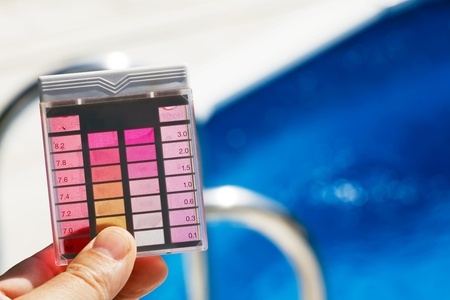With summer around the corner, every pool owner knows it’s time to start preparing for long hot weekends spent by the water. There are several factors involved in keeping your chlorine levels healthy- as well as other pool sanitation products.
Let’s take a look at the 4 main contributors to depleted chlorine levels, so you know what to monitor and how to keep your pool water healthy.
Sunlight Takes a Toll
Did you know that direct sunlight actually decreases the amount of available chlorine in your pool water? That’s right, your levels can actually drop up to 90% from several hours of direct exposure, due to UV rays’ ability to break down the chlorine. It ends up getting broken down on a molecular level, and released as a gas that no longer keeps the water clean.
There is actually a difference between “free chlorine” and “total chlorine” in your pool. Free chlorine is available for use, why a large portion of the total chlorine is already hard at work keeping the water sanitized.
This is why it’s important to keep the overall level between 7.2 and 7.6. You want to be sure your chlorine isn’t being used up- both by sunlight and contaminants- more quickly than what’s required for it to remain effective. If you’ve got a pool in full sun, check the levels regularly.
Warmth Takes a Toll
In addition to the UV rays from the sun, the warmth itself can increase the rate at which chlorine breaks down in your pool’s water. Every 10 degrees over 80 degrees Fahrenheit can potentially double the level of chlorine being used. Yet another reason to check it regularly!
The tricky thing is, it isn’t the warmth itself at play, but the fact that warm environments allow bacteria to multiply much more quickly. Add to that the fact that warmer water evaporates more quickly- and takes a bit of chlorine along with it. This means that hotter days are far more likely to deplete your chlorine levels- both from the bacterial growth in your water, and from the water loss itself.
Checking in After Heavy Spring Rain
While losing water is detrimental to your pool, due to secondary chlorine loss, extra water can have the opposite effect. A heavy spring rain can leave your chlorine levels off-balance due to the fact that extra water can dilute your chemicals.
If you see that your water level has risen after a storm, it’s best to check your chlorine levels. Rain storms can also wash in extra dirt and debris that make your pool chemicals work even harder to keep the water clean. Test kits are easy to find, and are a must-have for any pool owner.
Frequency of Pool Use
It should go without saying that any pool that’s used more often will need the chemicals monitored more closely. As discussed before, hair and body oil can put your chlorine on double-duty, especially with frequent use. Add to that the skin we slough off while swimming, plus the various skin care products we introduce to the water, and you can see how all of that makes for a lot of debris in your pool water.
Be sure you’re taking care of your pool’s chemicals and filtration system, just like you take care of your own skin in the sun. Check your levels regularly, rinse and replace your pool filter, and do a shock treatment when necessary.
